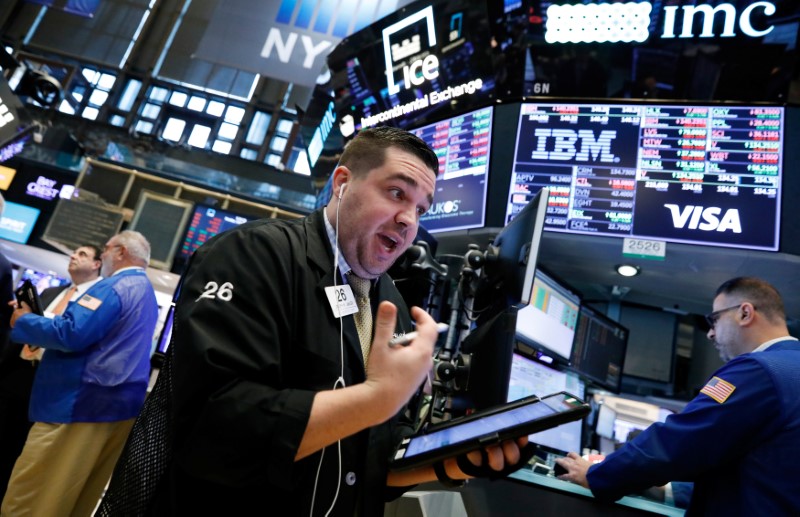By Laila Kearney
NEW YORK (Reuters) - Global stock markets sank on Monday as the trade fight between the United States and other top economies escalated, and benchmark Wall Street indexes suffered their worst losses in more than two months while safe-haven investments gained.
U.S. Treasury Secretary Steven Mnuchin on Monday said forthcoming investment restrictions would apply "to all countries that are trying to steal our technology," not just to China.
Hours later, White House trade and manufacturing adviser Peter Navarro walked back Mnuchin's remarks, telling CNBC that the restrictions on investing in tech companies would just target China.
“People are scared," said Wayne Kaufman, chief market analyst at Phoenix Financial Services in New York. "The market does not like uncertainty, and a trade war is something that is difficult, if not impossible, to handicap."
On Wall Street, the Dow Jones Industrial Average fell 328.09 points, or 1.33 percent, to 24,252.8, the S&P 500 lost 37.81 points, or 1.37 percent, to 2,717.07, and the Nasdaq Composite dropped 160.81 points, or 2.09 percent, to 7,532.01.
The pan-European FTSEurofirst 300 index lost 2.19 percent and MSCI's gauge of stocks across the globe shed 1.41 percent.
Technology stocks bore the brunt of the damage. The S&P technology index fell 2.3 percent, the most among the major S&P 11 sectors.
Policymakers in China moved quickly to temper any potential economic drag from Beijing's dispute with the United States. Its central bank said on Sunday it would cut the amount of cash some banks must hold as reserves by 50 basis points to spur lending to smaller firms.
The European autos sector was hit by trade tensions between Washington and Europe, falling 2.4 percent in a seventh straight day of losses after U.S. President Donald Trump said on Friday he aimed to hike tariffs on European Union car imports by 20 percent.
The index of global auto manufacturers fell 1.5 percent.
A senior European Commission official said on Saturday the European Union would respond to any U.S. move to raise tariffs on cars made in the bloc.
Harley-Davidson Inc (NYSE:HOG) said on Monday it would move production of motorcycles shipped to the European Union from the United States to its international facilities and forecast the trading bloc's retaliatory tariffs would cost the company $90 million to $100 million a year.
The growing disputes have led investors to take refuge on safer ground.
Benchmark U.S. 10-year Treasury notes gained 5/32 in price to yield 2.884 percent, down from 2.900 percent late on Friday. The yield curve between 2-year and 10-year notes flattened to 33 basis points, the lowest level since 2007.
Gold hovered near last week's six-month low as investors chose Treasuries over bullion.
Oil fell as investors prepared for an extra 1 million barrels per day in output to hit the markets after OPEC and its partners agreed to raise production.
U.S. crude fell 0.73 percent to settle at $68.08 per barrel and Brent settled at $74.73, down 1.09 percent on the day.
In the currency market, the dollar index fell 0.22 percent, with the euro up 0.38 percent to $1.1699.
The Japanese yen strengthened 0.21 percent versus the greenback, at 109.74 per dollar, while sterling was last trading at $1.3279, up 0.08 percent.
The Turkish lira rose on expectations of a stable government after Tayyip Erdogan and his ruling AK Party claimed victory in presidential and parliamentary polls.

Bitcoin steadied after hitting seven-month lows over the weekend as the security of cryptocurrency exchange operators came under more scrutiny.